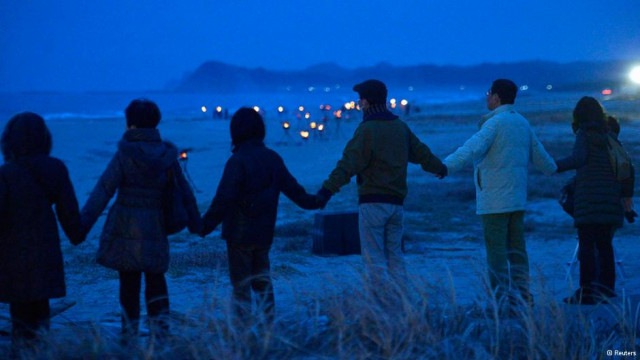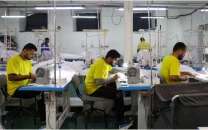Japan honours victims of 2011 quake, tsunami, nuclear disasters
Almost 300,000 people still live in temporary housing.

The triple calamities stunned a nation that had thought itself prepared for disasters. PHOTO: REUTERS
The 9.0 magnitude earthquake struck northeast Japan at 2:46pm, triggering tsunami waves as high as 30 metres (100 feet) that swept away residents and their homes.
Walls of water 13 metres high smashed into Tokyo Electric Power Co's (Tepco) Fukushima Daiichi nuclear plant north of Tokyo, knocking out its main power supply, destroying backup generators and crippling the cooling system. Three reactors melted down in the world's worst atomic accident since Chernobyl in 1986.
The triple calamities stunned a nation that had thought itself prepared for disasters and been taught to believe that nuclear power, which supplied nearly 30 percent of electricity at the time, was clean, safe and cheap. A panel of experts commissioned by parliament to probe the nuclear crisis dubbed it a man-made disaster resulting from "collusion" among the government, regulators and the plant operator.
Two years later, rebuilding the northeast - a region already suffering from a fast-ageing population and stagnant local industries including farming - is patchy. Almost 300,000 people still live in temporary housing.
"We are standing at the crossroads of having to decide how we will live and what actions we should take," said Sakari Minato, 49, an auto dealer in the town of Yamada in Iwate prefecture, now living in a house damaged by the tsunami.
"We are at the periphery. In Tokyo, the economy might be improving as stock prices rise, but it takes a long time for that effect to permeate to the periphery," he added, referring to the share price boom since Prime Minister Shinzo Abe took office in December pledging to revive Japan's stale economy.
The Fukushima Daiichi plant has been brought into a stable state known as "cold shut down" but decommissioning its damaged reactors will take decades and cost billions of dollars. Many of the 160,000 who fled will never be able to return.
Abe, who took office in December after his Liberal Democratic Party's (LDP) huge election win, has boosted the reconstruction budget to 25 trillion yen ($260 billion) from the 19 trillion yen over five years allocated by the government in power when the disasters struck.



















COMMENTS
Comments are moderated and generally will be posted if they are on-topic and not abusive.
For more information, please see our Comments FAQ